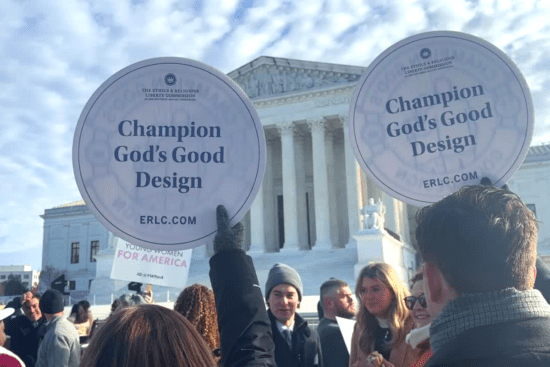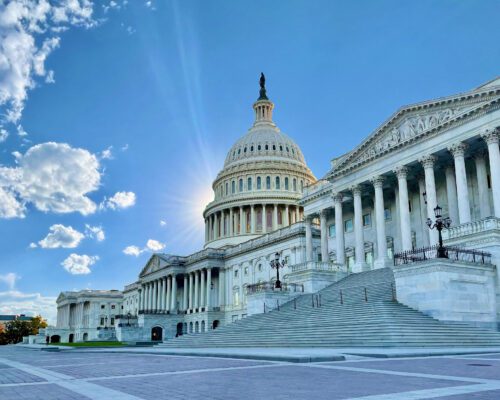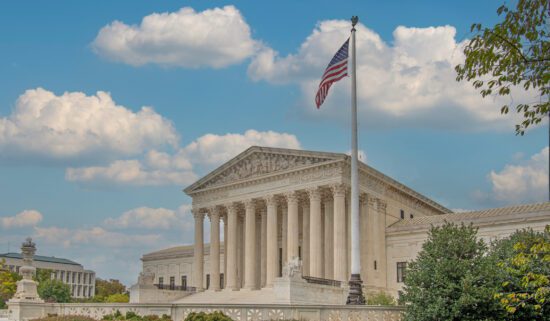The year 2015 presented a number of turning points in the ongoing journey of American religious liberty, which means that the year 2015 presented me with numerous opportunities to advocate in writing for universal religious liberty and a robust application of the First Amendment. Along the way I’ve encountered a number of interlocutors who have disagreed with me, both online and in real life. In all of those discussions, I’ve yet to meet anyone who objected in principle to the First Amendment or the abstract idea of religious liberty. Rather, agreeing with a desire to have religious liberty, they have simply argued that the circumstances of the present epoch are unprecedented or unanticipated by the First Amendment and that the needs of the moment justify some sort of a codicil to the Bill of Rights that the Founders bequeathed to us.
Some argue that religious liberty is all well and good until it comes into conflict with some important something that the government is trying to accomplish. This has been the general perspective of President Obama and his administration. We need to provide universal health insurance coverage. We need to make certain that contraceptives and abortifacients are readily available to all women without cost or encumbrances. We need to ensure that discrimination does not happen in employment decisions or in retail commerce. Such objectives have brought President Obama into conflict with the Hosanna-Tabor Lutheran Church, Arlene’s Flowers, and the Little Sisters of the Poor, and in each case the President has come to the conclusion that the needs of the moment outweigh the liberties provided in the First Amendment.
Of course, the idea that religious liberty might come into conflict with important government objectives is not a possibility unanticipated by the First Amendment; it is the amendment’s very reason for existence. We have a Bill of Rights precisely because the Founders anticipated that the government would want to do a lot of things. We have a Bill of Rights for the express purpose of forcing government to abandon its purposes when it cannot accomplish them without curtailing inalienable rights. People who believe we should have a Bill of Rights until it becomes inconvenient for their party’s platform are people who simply haven’t yet admitted to themselves that they don’t believe we should have a Bill of Rights.
Others have argued that religious liberty is a guarantee that the Bill of Rights extends to American citizens but that we owe no recognition of religious liberty to non-citizens. We entered this quaint little cul-de-sac of First Amendment studies, of course, because Donald Trump and others suggested that religious liberty should not apply to American immigration law, but it is also a key premise of the pro-abortion movement (“Fetuses are not persons under the Constitution, hence they are not citizens, hence they have no right to life”).
This suggestion fundamentally misunderstands the Declaration of Independence, the Constitution, and the Bill of Rights. This country was founded upon the idea that some rights are inalienable. In other words, there are rights that people have not because of their race, their citizenship, their age, their stage of development, their national origin, or their creed. There are rights that government has not granted to people and that no government can revoke from people successfully or legitimately. Some rights human beings receive directly from God simply by virtue of being human beings. These rights are inalienable (that is, government has no authority to alienate you from them…to remove them from you).
The Declaration of Independence famously lists three inalienable rights: life, liberty, and the pursuit of happiness. Notice, however, that the text carefully indicates that this list is but a starting point: “…AMONG THESE are life, liberty, and the pursuit of happiness.” Since before the founding era Baptists have concluded that religious liberty is among the inalienable rights not enumerated in the Declaration of Independence. In fact, the most famous Baptist pamphlet published during the founding era on the subject of religious liberty was John Leland’s “The Rights of Conscience Inalienable.” In this masterful document, Leland (successfully) argued that freedom to follow the dictate of one’s conscience in matters of faith is not a right that government was free to award or revoke but that it is one of the inalienable rights granted to all people by God. Leland’s way of thinking won the day when we ratified the Bill of Rights.
If religious liberty is an inalienable right, then our government does not choose who deserves it and who does not. If religious liberty is an inalienable right, then it belongs to every living soul from the moment of his or her conception until the moment of his or her final heartbeat. If religious liberty is an inalienable right, then our government recognizes it in the case of citizens and non-citizens alike.
A related misconception concerns the role of the Constitution. It is the function of our Constitution, generally speaking, not to dictate what citizens may do but to dictate what government may not do. This is not universally true. The Second Amendment is phrased as a right granted by government to people in order to pursue a needed governmental objective. The First Amendment however, like most of the Constitution, restrains the federal government: “Congress shall make no law regarding an establishment of religion or restricting the free exercise thereof.” The text is quite clear. It does not read, “Congress shall make no law…affecting citizens.” It does not read, “Congress shall make no law…affecting our friends.” It issues a blanket denial: Congress is barred from being involved in any way whatsoever with empowering the federal government to violate people’s religious liberty. Why does the First Amendment read thusly? Because the Founders recognized religious liberty as an inalienable right belonging not only to American citizens but also to all people.
A third line of thinking has suggested that the First Amendment does not anticipate the idea that a system of religious belief might be intertwined with a political system. Islam, the argument goes, favors the establishment of a theocratic state. Some have gone so far as to argue that a religion ceases to be a religion when it holds such political views. I’ve lost count of how many times this year I’ve read or heard the words “Islam isn’t really a religion; it’s a political system.”
Poppycock.
Our nation came into existence fighting against King George, the Supreme Temporal Head of the Church of England. Anglican worship featured regular public prayers in worship services for the health and sovereign rule of King George (no parallel exists in any mosque today). Virtually all Anglican clergy fled the colonies during the war. The First Great Awakening, successfully moving people out of Anglicanism and into Presbyterian and Baptist churches, is generally recognized by historians as a major precursor of the American Revolution specifically because Anglicanism was a faith held part-and-parcel with a theocratic theory of government.
On November 13, a gang of terrorists executed a coordinated attack against the city of Paris, murdering 130 innocent people and injuring another 368. The so-called Islamic State quickly took credit for the attack, adding it to a column of recently successful campaigns including the downing of a Russian commercial airliner and a suicide bombing in Beirut. The events in Paris shook the consciousness of the entire free world.
Fewer people took note of the events of November 5. A terrorist in London was apprehended guarding a cache of high explosives. He was a member of a network comprised of British citizens and immigrants. The groups had sworn their allegiance to a radical cleric with a long-range plan to bring all of Europe under a theocratic state. After interrogating the apprehended radical, the British government discovered details of a plot to destroy a major London landmark with carefully placed high explosives.
Oh, I failed to mention something important: The events of November 5 took place in 1605. The radical cleric was Pope Paul V, the major London landmark was Parliament, and the captured terrorist was Guy Fawkes. Eight days prior to the 2015 terrorist attacks, fireworks exploded in the skies over London celebrating the 410th anniversary of the defeat of Catholic terrorism.
Some might argue that the Anglican experience during the American Revolution was different because the British weren’t terrorists, but the Roman Catholics had their Gunpowder Plot, the Anglicans had the events that inspired the movie “The Patriot,” and even Baptists and Anabaptists had to live down the events of Münster. I don’t know of a religious faith that doesn’t include some sort of a theology of politics. I don’t know of a religious faith that hasn’t made mistakes in its application of theology to politics. If we’re going to say that religious liberty doesn’t extend to religious faiths that include a theory of politics, then we no longer have religious liberty for anyone.
The better thing that we’ve done is to say that people are free to hold and exercise their various religious faiths without governmental interference, including the right to believe that the government ought to be this way or that. Anglicans are free to believe that Queen Elizabeth ought to be the temporal head of the church. Roman Catholics are free to believe that Congress ought to do silly, un-American things like send an ambassador to the Vatican and host joint sessions of Congress for popes. Muslims are free to imagine that we might be better off under sharia law. Whatever their opinions, they have to agree to abide by the guarantees of the First Amendment if they are going to live here. If they are fomenting insurrection, prosecute them to the fullest extent of the law. If they are doing so from their pulpits or chancels or lecterns or mosques, walk right in during the worship service and arrest them. But let us only impose legal penalties for actual illegal acts; let us never impose religious tests or persecute people on the basis of their mere religious beliefs, even when they have political implications. That has been our approach for more than two centuries, and it is amazing how well it worked with systems of belief as varied (and theocratic) as British Anglicanism and Japanese Shinto.
Nothing—not one thing—about our present situation is unanticipated by the Founders who drafted the First Amendment. They did not lack our knowledge of the world. They did not lack our understanding of the intricacies of government. They did not lack our exposure to different religious systems of thought.
The deficiency is not on their part at all.
Sometimes we are the ones who are lacking. Sometimes we lack their commitment to principle. Sometimes we lack their robust and nuanced insights born of late nights huddled in secret rooms contemplating the foundational questions of government and liberty. Almost always, to be blunt, we lack their courage. Thankfully, they left us a document to protect us from ourselves in our moments of weakness, fear, doubt, and lack of information. Whatever 2016 brings us, I dare hope that their plainly worded sentiments and the provident hand of our Lord Jesus Christ will be sufficient to guide us through this troubling and turbulent epoch.
Bart Barber
Bart Barber is the pastor First Baptist Church of Farmersville, Texas.










